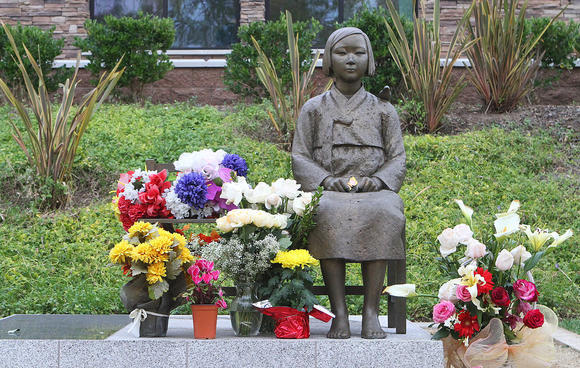Japan Demands Removal of South Korean Memorials to Japanese War Crimes

Japanese officials have demanded that South Korea remove memorials in Korea and abroad commemorating the Japanese Imperial Army’s use of Korean sexual slaves during the Second World War, Yonhap News Agency reported Sunday, citing South Korean government sources.
The demand was made this week during a monthly meeting between South Korean and Japanese officials. This was the fifth round of talks launched earlier this year in an attempt to resolve outstanding bilateral issues between the two countries, Yonhap explained.
The Japanese side demanded that South Korea remove a statue commemorating Korean sex slaves, which were euphemistically known as ‘comfort women’, in front of the Japanese Embassy in Seoul, as well as monuments in several US cities. South Korean officials were said to have reacted negatively, saying that the monuments were installed by private groups via donations.
"If Japan resolves the military comfort women issue, it will naturally influence the [monument building] movement by private groups…it is not something that the [South Korean] government could guarantee," a high-ranking South Korean official told Yonhap. "Our position is that Japan should come up with resolutions that can appease the victims," the unnamed official added.
The painful memory of the Korean sex slaves, who were forced to serve in brothels for the Imperial Japanese Army during the war, is one of the most difficult outstanding issues in South Korean-Japanese bilateral relations. Seoul is said to be pressing Japan to issue an apology and compensation to the 54 remaining living victims of the wartime atrocities (their average age is now 88), IBT explained.
Japan, meanwhile, has vacillated between vague acknowledgement and hostile denial of its wartime crimes, stating that all disputes, including compensation issues, were settled by the 1965 Treaty on Basic Relations between Japan and the South Korea, as well as the 1993 Kono Statement. The former had given South Korea about $800 million in grants and soft loans for development, while the latter had acknowledged that the Imperial Army was implicated in the establishment of the brothels.
Since then, however, it has been debated whether the Kono statement had actually acknowledged that coercion was used in the recruitment and retention of the women, who numbered up to 200,000, most of them from Korea and China. In 2007, Japanese Prime Minister Shinzo Abe questioned whether the women were actually coerced into working in the brothels, and this year his government has decided to launch a ‘review’ of the Kono Statement’s details, a move criticized by both South Korea and China.
Abe made further controversial remarks this summer when he paid tribute to Japanese military commanders from the Second World War, offering his “sincere condolences to the spirits of those Showa martyrs who gave their lives for the sake of today's peace and prosperity, becoming the foundation of the fatherland,” the BBC had quoted him as saying. The remarks prompted China to urge Japan to “make a clean break with militarism.”
The Japanese demands for the removal of monuments in Korea and abroad also follow on a resolution earlier this summer by authorities in Tokyo to remove a monument dedicated to the tens of thousands of forced laborers who were brought to Japan to work in the country’s coalmines and factories during the war. The municipal authorities had refused to renew the monument’s license, calling the monument “anti-Japanese,” the Guardian reported.
Article Source: http://sputniknews.com/asia/20141130/1015320772.html
Image Source: http://www.trbimg.com/img-5308fbf5/turbine/la-glendale-comfortwomen-statue-sparks-lawsuit-001/580/580x368
VOCABULARY WORDS:
1. Memorial (n.) ~ something serving as a remembrance
2. Commemorate (v.) ~ to honor the memory of with a ceremony
3. Bilateral (adj.) ~ affecting or undertaken by 2 sides equally
4. Euphemistically (adv) ~ the act of substituting a mild or indirect term for one considered harsh or blunt
5. Appease (v.) ~ to satisfy or relieve
6. Brothel (n.) ~ a building where prostitutes are available
7. Compensation (n.) ~ something is given as payment or reparation
8. Atrocity (n.) ~ appalling condition, auality, or behavior
9. Vacillate (v.) to sway from one side to the other
10. Latter (adj.) ~ being the second of the 2 things or people mentioned
11. Coercion (n.) ~ the act of forcing to act or behave in a certain way
12. Retention (n.) ~ the act of maintaining possession of
13. Tribute (n.) ~ evidence attesting to some praiseworthy behavior or quality
14. Condolence (n.) ~ sympathy with a person who experienced pain, loss, or misfortunes
QUESTIONS FOR DISCUSSION:
1. What is Japan’s demand on South Korea?
2. In your opinion, should South Korea adhere to Japan’s request for the betterment of the diplomatic relationship between the 2 countries? Why?
3. What can Japan do to appease the Korean people especially the “comfort women” and their families?
4. The war crimes were committed decades ago, so why is it still a sore issue for most Koreans?